C. Litka's Blog, page 26
December 16, 2023
The Saturday Morning Post (No.26)

More rereads this week. While I was waiting on some library books I went to my book shelf and picked out the next two books from my favorite fantasy series; Garret P.I. by Glen Cook. I had read the proceeding ones sometime in the last year or so.
My reviewer criteria. I like light, entertaining novels. I like smaller scale stories rather than epics. I like character focused novels featuring pleasant characters, with a minimum number of unpleasant ones. I greatly value clever and witty writing. I like first person, or close third person narratives. I dislike a lot of "head jumping" between POVs and flashbacks. I want a story, not a puzzle. While I am not opposed to violence, I dislike gore for the sake of gore. I find long and elaborate fight, action, and battle sequences tedious. Plot holes and things that happen for the convenience of the author annoy me. And I fear I'm a born critic in that I don't mind pointing out what I don't like in a story. However, I lay no claim to be the final arbitrator of style and taste, you need to decide for yourself what you like or dislike in a book.
Your opinions are always welcome. Comment below.
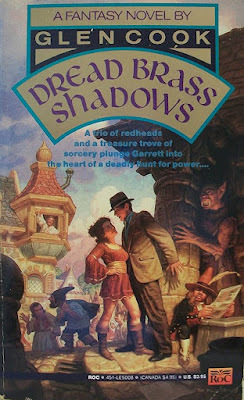
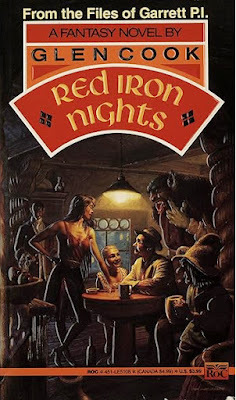
Dread Brass Shadows By Glen Cook B+
Red Iron Nights by Glen Cook B+
I may've mentioned once, or twice, or three times before that I'm not much of a lad for fantasy, and yet it seems that I'm always reviewing fantasy books. Hard to explain. In the case of these books, however, it can be easily explained by the fact that I first started reading them thirty-some years ago, when the division between fantasy and SF wasn't all that wide. That, and the fact that they are a mashup of hardboiled detective fiction and fantasy, and being a big fan of Raymond Chandler, I was naturally ready to give that mashup a try. Since then I've read all 14 of them written between 1987 to 2013 several times over the years. They're that good.
Make no mistake, Glen Cook is no Raymond Chandler when it comes to prose. He keeps his tongue firmly in his cheek with his private eye narrator, Garrett, ex-Fleet Marine. ".. and I were heroes of the Cantard Wars. That means we did our five years and got out alive. A lot of guys don't." He likes women, and women like him - the stories are not quite "woke", having been written before that became a thing. Nevertheless, the stories feature plenty of independent women with agency. Just say'n.
Probably what made me pick up the first Garrett PI book was its cover that shows Garrett in his office, dressed in a trench coat, smoking a cigarette with fedora on the hat rack, facing four dwarfs, one totting a submachine gun. The artist took a great deal of artistic license with this cover. Garrett doesn't smoke, doesn't go around in trench coats, doesn't wear fedoras, nor are there any firearms in this world. Even swords are banned in the city. Even so, it succeeds in giving the potential reader an accurate the flavor of the story. All the covers of the other books are equally inaccurate, still feature Garrett as a modern looking PI, for the same reason; mood.
Glen Cook is the author of the "Black Company" books which recount the grim lives of various mercenary bands in a long war. They are sometimes considered the first "grimdark" fantasy novels. But in the Garrett PI series, while there are certainly dark deeds and scenes, evil people and creatures, he employs the wise-cracking Garrett as the narrator, who lightens up these stories with humor and wry observations on humanity, politics and religion.
Cooks sets this series in a world wracked by a long running war in the region known as the Cantard, which is rich in silver. This war is being fought by armies, fueled by the universal draft of human males, and sorcerers, who use silver to power their magic. With the exception of the first book, Sweet Silver Blues, which takes us to the Cantard, all the rest of the books take place in and near the mean anc colorful streets of TunFaire. Humans share the world, and TunFaire with just about every sort of mythical being, god, and creature you can think of. I mean that. In these stories you'll meet dwarfs, elves, giants, goblins, gnomes, fairies, pixies, vampires, werewolves, centaurs, gargoyles, "thunder-lizards" and flying dragons, rat people, shape shifters, all sorts of "breeds", assorted gods, aliens, and, a dead Loghyr, whose body is long dead, but whose telepathic mind isn't. Trust me, TunFaire has a very diverse population.
Against this colorful backdrop, Cook sets a very typical, intricate, and inventive series of detective stories. They fall well within the hardboiled detective formula. Garrett is a good guy who often gets beaten up as he attempts to help clients who have come to him in some sort of trouble. After the first story whose proceeds enable him to buy the house that hosts the dead Loghyr, the "Dead Man", making it his fortress headquarters. The Dead Man acts something like Mycroft Holmes, a thinker, who can read mines, and use his own to control others close at hand. In addition Garrett has a group of friends/associates, whose aid he can call on, when needed, which is often. This including the fussy old man Dean, who comes to cook and look after him and the house, Morley Dotes, a vegetarian restaurateur and hired assassin, Saucerhead Tharpe, a thug for hire, Playmate, a black stable owner and would be preacher, and a host of other characters who, over the course of the series, become part of his entourage, becoming something of a "found family" or a band of brothers, that adds a familiar and cozy vibe to the series as it goes on. Arrayed against him can be the powerful mob boss of TunFaire and his hardboiled henchmen, plus kidnappers, powerful and corrupt sorcerers, churchmen, and various other baddies.
Well, I've gotten this far without saying much of anything about the books I'm supposed to be reviewing. I'm not going to say much about them as they are intricate, and I read them a couple of weeks ago... Moreover, while each story can stand on its own, each installment adds a layer of meaning to the series, so that you should start with Sweet Silver Blues, and read your way through them. Still for the sake of a brief overview; Garrett's case in Dread Brass Shadows involves a book of magic engraved in brass sheets, with each page describing a different powerful person or creature, which if read, will turn the reader into that type of person or creature. Magic too powerful to be allowed to exist. And in Red Iron Nights, Garrett helps the local police force track down an ancient curse that has reappeared in TunFaire, one which compels the person who has it to ritually kill a certain type of young woman. Can Garret find the source of the curse before it kills again? As I said intricate mysteries with lots of colorful side characters.
Given the reputation Cook has for his Dark Company books, I don't understand why these, and several other of his fantasy series are so overlooked. But then, I suspect that a lot of fantasy books from 20 or more years ago, are overlooked these days by contemporary fantasy readers, because there is just so much contemporary fantasy to read instead.
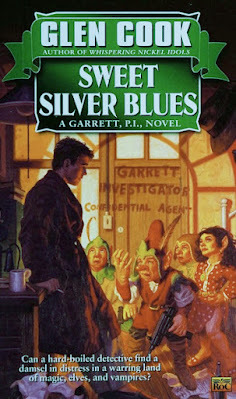
December 13, 2023
The Sunsets of Summer 2023

I usually try to spend every day in just a'settin in my rocking chair watch'n the sun set on another summer's day - when the sunset is visible. The summer of 2023 was not a vintage year for sunsets. Pretty ones were few and far between. I think there were two factors that may've worked against photographable sunsets. The first was that it was a pretty dry summer, so that by the time the sun was setting, there the sky was usually cloudless. The second factor was that between the smoke from Canada burning, the heat and the ozone, the sun often disappeared behind a smuggy layer of smoke and ozone before it ever reached the distant hills.
The photo above and directly below are actually looking east at sunset, away from the setting sun. You getz what photos you can.

The photos below are now looking to the west, to the sunset. The first one is towards the southwest, the trailing edge of a little thunder storm.

The one below, we're looking a bit to the north west for probably the most dramatic photo of an actual sunset this summer.

The photo below was taken on a threatening evening when everything was very orange. It was taken on the same evening as the second photo above, this time looking west.

And finally a very mellow sunset, just a step up from the bog standard sunsets of 2023. Not a lot of clouds, but the air was free enough from smoke for the sun to set behind the hills and clouds over Minnesota.

Oh well, there's always next year. Maybe. I'm at that age where you have to always add "maybe" when talking about next year. Just standard procedure.
December 9, 2023
The Saturday Morning Post (No. 25)
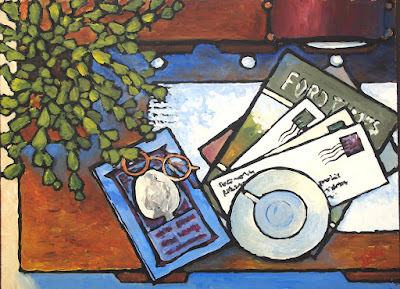
This week I came across a series of books while waking through the stacks of the local library, and picked up two of them, An Irish Country Village, and An Irish Country Courtship by Patrick Taylor.
My reviewer criteria.I like light, entertaining novels. I like smaller scale stories rather than epics. I like character focused novels featuring pleasant characters, with a minimum number of unpleasant ones. I greatly value clever and witty writing. I like first person, or close third person narratives. I dislike a lot of "head jumping" between POVs and flashbacks. I want a story, not a puzzle. While I am not opposed to violence, I dislike gore for the sake of gore. I find long and elaborate fight, action, and battle sequences tedious. Plot holes and things that happen for the convenience of the author annoy me. And I fear I'm a born critic in that I don't mind pointing out what I don't like in a story. However, I lay no claim to be the final arbitrator of style and taste, you need to decide for yourself what you like or dislike in a book.
Your opinions are always welcome. Comment below.
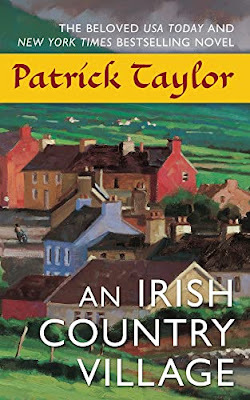
An Irish Country Village by Patrick Taylor DNF 10%
This is apparently a series of 17 books, many of them set in the small fictional village of Ballybuckledo in Northern Ireland. The series is set in the late 1960's and concerns a new doctor taking up practice in the village with an older doctor. A patient of the new doctor has died and he must regain the regard of the village. If you imagine All Creatures Great and Small, with doctors instead of vets, set in the 60's instead of the 30's, and in Ireland instead of the North of England, you will know the story format. While I enjoyed All Creatures Great and Small (the old TV show more than the books) this story didn't work for me for several reasons.
The first element was the writing. I can't quite put my finger on it, but it simply didn't click with me. It seemed rather simple, YA-ish almost, not very cohesive, and rather repetitive. And yet, there was this frequent abruptness in the scenes that I often left me briefly lost. The writing just didn't flow. I found that I had to work to read it. Still the spine of the library book did have a sticker with a butterfly on it, that said "Gentle Read" for what that's worth.
Next, the characters seemed unrealistic, again for a reason I couldn't put my finger on. Perhaps because of the writing, and perhaps because this was the second book in the series and I had missed too much. The first book wasn't on the shelf, so there may be an assumption on the part of the author that the reader would know the characters better than I did, starting from where I did. The third thing; it read too much like an All Creatures Great and Small knock off. You have the somewhat outrageous, but wise older doctor and the young, somewhat insecure, new doctor, just trying to work his way into the practice and the local inhabitants. The older doctor struck me too much like Siegfried, at least in the original TV series version of that character. Why settle for a knock off?
And the fourth thing was that the author, a doctor himself, spent too much time describing every little medical treatments, step by step, something that just doesn't interest me at all.
When I have to force myself to read a book, I know that the book isn't for me. And I simply found myself putting it down with no desire to continue reading it at around the 50 page mark of a 500 page book. Lord knows how he strung the story out that long. I won't know.
December 6, 2023
Blame it on Harry
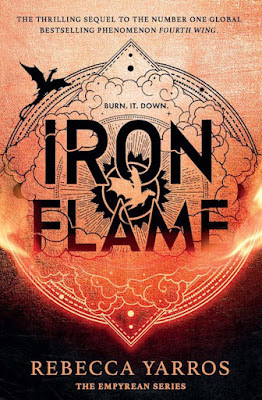
Two weeks ago I wrote about how much more popular fantasy was than science fiction, something like a factor of 4 to 1. This past Friday evening, I had confirmation of that result. It was an eye opening experience.
I was drafted into providing dinner for a number of my wife's relatives who had arrived in town for "Cookie Bake Weekend". My sister-in-law had brought along a copy of the fantasy/romance book Iron Flame by Rebecca Yarros, the sequel to The Fourth Wing, which if you recall dominated the ratings in the Goodread's Best Book of 2023 list for romantasy. It has sold more than 800,000 copies to date. I gathered that it was a spare copy. Her daughter, Julia had gotten the special edition, and she wondered if Sadie, my granddaughter, would be interested in it. Of course she would. She's been into fantasy since her mom read Harry Potter to her before she could read, and has been reading fantasy ever since. Dark fantasy with romance, which, I gather is what she loves, and which The Fourth Wing and Iron Flame very much are. Sadie had already read The Fourth Wing and so had the 30-some year old Julia, and her two friends, as well as my daughter. Most had also read or were reading the Iron Flame as well. It was quite a confab, crimped only by trying to avoid spoilers nor was it confined to just those books, but others of that vein as well. I gather they had much more to say while making cookies the following day; after Sadie stayed up to 11 getting a start on Iron Flame.
Moreover, in a break in the conversation I asked Sadie how she enjoyed the Dungeons and Dragons club at the high school that she joined. She said that loves it, and discovered that one of Julia's friends plays D & D with her friends every Tuesday, so they had D & D stuff to talk about as well.
Of course this is not a true cross section of women age 15 to 40-something, but I think it shows just how powerful J K Rowling's influence was on the millennial/Gen Z generation. There is no doubt in my mind that the Harry Potter series written between 1997 to 2007 shaped the reading tastes of two generations of readers.
My daughter would have been just entering college with the first book appeared, and since I got a Harry Potter book each year for Christmas, she must have been reading them as well. Plus I have several slightly younger nieces who I know are also into fantasy, dating from the Harry Potter era and all those YA fantasies that followed.
And it seems that all those first generation Harry Potter fans have now been reading Harry Potter books to their children ever, which I think goes a long way to explaining the growing popularity of fantasy today. Of course Sadie and her younger brother were also Star Wars fans when young, but middle school/YA fantasy books are much more numerous than SF, and perhaps more approachable as well. And it seems, much more appealing to girls and women. My daughter did read the Harry Potter stories to my grandson as well, but he's more into sports and Roadblox than reading, which I guess is fairly typical for boys.
So as the title suggests, I think that fantasy owes a great debt to Harry Potter. There was the Lord of the Rings, and scores of it imitators prior to Harry Potter, but the J K Rowling's books struck such a wide and resounding cord in the young readers of that time, that I think those books overshadow all those other fantasy books combined. And I have no reason to believe that this second generation of Harry Potter/fantasy fans won't be reading Harry Potter to their kids just as soon as they can.
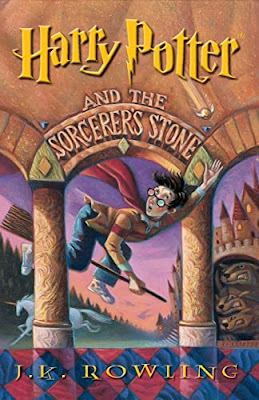
December 2, 2023
The Saturday Morning Post (No, 24)

Today we take a look at a hybrid biography/autobiography of a fictional woman, as an early scientist in the field of botany.
My reviewer criteria. I like light, entertaining novels. I like smaller scale stories rather than epics. I like character focused novels featuring pleasant characters, with a minimum number of unpleasant ones. I greatly value clever and witty writing. I like first person, or close third person narratives. I dislike a lot of "head jumping" between POVs and flashbacks. I want a story, not a puzzle. While I am not opposed to violence, I dislike gore for the sake of gore. I find long and elaborate fight, action, and battle sequences tedious. Plot holes and things that happen for the convenience of the author annoy me. And I fear I'm a born critic in that I don't mind pointing out what I don't like in a story. However, I lay no claim to be the final arbitrator of style and taste, you need to decide for yourself what you like or dislike in a book.
Your opinions are always welcome. Comment below.
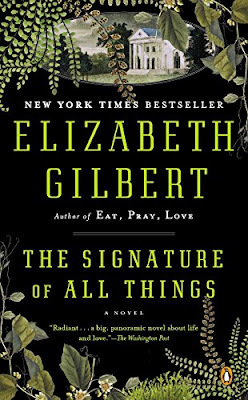
The Signature of All Things by Elizabeth Gilbert B
This novel encompasses the fictional life story of Alma Whittaker. Born in 1800 Philadelphia, the daughter of a wealthy botanical explorer/business man, and a Dutch mother who comes from a family of Dutch horticulturalists. We follow her life from her childhood to a ripe old age of 80. Raised in wealth on a large estate outside of Philadelphia, she is encouraged to explore the natural world from an early age. Gifted with the plain speaking logical mind of her mother, and the drive for knowledge of her father, over the course of decades she becomes a respected botanist within a circle of scientist of similar interest, despite being a woman, eventually becoming the world's most respected expert on mosses.
As I mentioned in my brief intro, this book reads, in parts, like the biography of a real person. Indeed, like many biographies, the first 80 some pages doesn't even concern her at all, but rather describes the early career of her father, written in the style of a popular biography, which is to say with wit and charm. Though it includes many details of the time and places, it still moves nicely along. As does the whole book, for the most part. It is told as a biographer might tell the tale - "told" being the operative word, rather than shown. However, it also reveals many intimate details and thoughts of Alma Whittaker that would only be known to Alma Whittaker, and set down as a very candid modern autobiographer, thus its somewhat of a hybrid between the two types of biographies. It also presents scenes and conversations between people, as one would find in a novel, so that respect, it is a double hybrid; biography/autobiography/novel.
I found this book mentioned in one of James Harris' recent posts. He describes it as science fiction - not as the type of book we think of when we hear science fiction, but as a book of fiction that concerns itself with science. And that is what is it is; a story about about science and the times, as well about the role of women in the world, the world's expectations of them. And about the women who defy those expectations.
Perhaps the most profound thing that I came away with, after reading this book, is how deficient we are these days in new things to discover. Tangible things, things we can see, touch, understand. This book, has Alma's father sending people around the world to discover and ship home new plants to describe and grow in his greenhouses. Tangible new discoveries. Not software code or quantum mechanics. Oh, I am sure there are still a million things to discover, but they have become increasingly esoteric, things so small in scope that it takes years and PhDs to discover, study and appreciate them. These days it seems that fantasy fiction has come to overshadows science fiction, and I have to wonder that is, in part, because there seems to be so few things left to discover in science, things that would interest more than a PhD searching for grant money.
Anyways, back to the book. Elizabeth Gilbert has written a very entertaining novel, despite reading more like a work of non-fiction for much of the time. Perhaps that is its strength; its biographical format allows the reader to believe that Alma Whittaker was a real person, while its very candid autobiographical makes her more than the subject of a biography written a century after the person lived. My only criticism of the book is that I think it went on too long and simply got too wordy, for my tastes in the last quarter of the book, so that I found myself skim reading parts of the story set in Tahiti. But, as usual, that's on me, not the author. I don't have the attention span I may've once had.
It's a solid read, offering a thick slice of history, science, with a glimpse of life in Tahiti as a bonus.
November 29, 2023
Red Side Story, Again
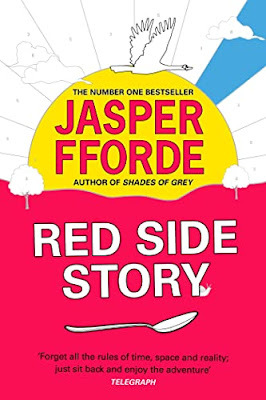
It's not here yet, but it looks to be actually coming. Hard to believe. There's a saga connected with this book. I've already written on post on this book, back in January of 2022, and then added some updates to that post.
The story starts back in 2010 when Jasper Fforde's Shades of Grey was released. I love that book, it is one of my favorite books of all time, for some reason. Originally it was to be the first book in a trilogy, the two books to follow were to be Painting by Numbers, and The Gordini Protocals. I couldn't wait for them. But wait I did. For years. I despaired of living long enough to ever read them. Eventually I found a YouTube video where he said he was first planning to write a prequel. He never did. And finally, I found somewhere that said that the two sequels had been cancelled due to disappointing sales of Shades of Grey. Such is life.
Fast forward to January 2022, where I found on the File 770 blog that Fforde's birthday was January 11th. I commented on how much I enjoyed Shades of Grey, and lo and behold, another commenter pointed out the fact that he was planning to do a single sequel; Red Side Story to complete the story. I jumped over to Amazon UK, found its listing, with a place holding cover, and a release date, in Britain, set for August 11, 2022, just 8 moths away. I might live to read it after all, I thought. I preordered it instantly.
Alas, in due time, I got notice that the the release date had been pushed back to April 2023. I kept my preorder, and hoped. And then some months later I received a notice that it had been pushed back yet again, this time to February 6th 2024. By this time I had my doubts that it would ever come out, or I'd live to read i, if it did. It seems that Jasper Fforde takes years longer to write his books then he expects to. I think Shades of Grey was also long delayed and I know that his follow up adult book, Early Riser was delayed, I'd like to say, for almost two years. So basically, I was no longer holding my breath. Indeed, I forgot about it.
Recently I remembered it, and not having heard of any more delays, I decided to check the status of my preorder. To my great surprise, not only is the date still 6 February 2024, but it now has the actual book cover (pictured above) which tells me that the book is finally ready to go.
Of course, my joy is now tempered with the realization that it is very hard for a sequel to live up to the standard of one of, if not, my favorite book. Shades of Grey left lots of secrets to be revealed, as the story is set after "something happened" but what happened we don't know. And well, the character are a different sort of human, so what's with that? Will the answers be worth the mystery and the long wait or not? In short, how will Red Side Story affect my love of Shades of Grey? Will it increase it, or will it prove to be a disappointment, and the answers tarnish my fondness for the first book? I have only 2 1/2 months to wait (after waiting 13 years) to find out. Fingers crossed.
November 25, 2023
The Saturday Morning Post (No. 23)
C
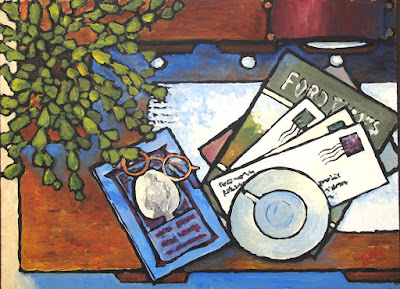
Today we are reviewing another fantasy novel, and its anecdote.
My reviewer criteria. I like light, entertaining novels. I like smaller scale stories rather than epics. I like character focused novels featuring pleasant characters, with a minimum number of unpleasant ones. I greatly value clever and witty writing. I like first person, or close third person narratives. I dislike a lot of "head jumping" between POVs and flashbacks. I want a story, not a puzzle. While I am not opposed to violence, I dislike gore for the sake of gore. I find long and elaborate fight, action, and battle sequences tedious. Plot holes and things that happen for the convenience of the author annoy me. And I fear I'm a born critic in that I don't mind pointing out what I don't like in a story. However, I lay no claim to be the final arbitrator of style and taste, you need to decide for yourself what you like or dislike in a book.
Your opinions are always welcome. Comment below.
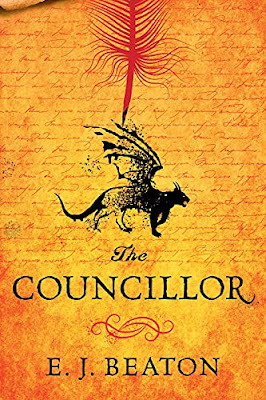
The Councillor by E J Beaton DNF 6%Beaton is an Australian who has a PhD in English (Creative Writing), and by god, it shows. Masters of Fine Arts eat can eat her dust and be damned, she's a Doctor of English and Creative Writing and wants you to know it. Plus she's an award nominated poet as well.
I don't believe I've ever read 24 more frustrating pages than the first 24 pages of The Councillor. If you're looking for deliberate obscurity, opaqueness, ornateness for the sake of ornateness and obscurity... story be damned, you'll have found it in this book. There is a story in there, somewhere, I guess, amongst the dreams, the flashbacks, the obscure references to things, places, events, and people we don't yet know anything about. What I can tell you is that the main character is the palace scholar, an aide to the Queen. The Queen has been attacked by a panther, with yellow eyes, while hunting, and was severely mauled. She is then poisoned to death, leaving our scholar the task of choosing someone to be the next ruler of the realm, since the Queen has no heirs.
This book seems to be the favorite of several fantasy booktubers, which is how I became aware of it. However, they get advanced review copies of books like this. I never quite trust reviews from ARC readers, as it is in their interest to give the best possible review so as to be known to the publishers as reliable promotors of their books, in order to keep getting free books from those publishers... I'm not saying that they didn't like it, I just don't trust what they say. In any event, this book is clearly not for me. It did however bring to mind the the opposite type of writing, writing that is both descriptive and concrete instead of dreamy and obscure, and the master of that type of writing. Indeed, I reached over to the book shelf next to me and picked out one of his books and started to read it, more or less as an antidote to The Councillor.
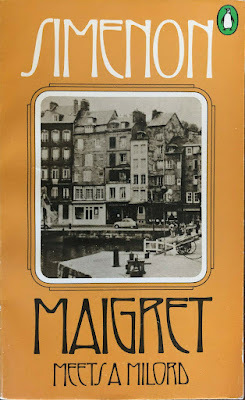
Maigret Meets a Milord by Georges Simenon B-
The Belgium born writer, Georges Simenon wrote around 500 novels and many other books and stories in his long writing career. From his introduction in 1931, the Paris police Chief-Inspector Jules Maigret appeared in 75 novels and 28 short stories. Maigret Meets a Milord is his second novel, written in 1931 and translated into English in 1935. The edition I have, pictured above, is one I've had around for 50-some years. It is old and glue holding the pages had dried and cracked so that the pages were falling out of it as I read it.
In this story Maigret has been called to a small city northeast of Paris to investigate a murder of a woman, a murder that appears to be connected to the traffic of barges along one of France's many canals. In all these stories Maigret tries to put himself in the minds of the people involved in order to understand not only what occurred, but why it happened as it did. To do so, he talks to people and wanders around, taking in the atmosphere, as it where.
In this case, Maigret must determine first, who the woman is and then how she ended up strangled in a barn along the canal. It would seem that barge traffic on the canal was the only explanation for her to end up in the barn, so he delves into the workings of life on the canal, with its horse pulled or motor driven barges. Their movement is regulated by a series of locks, so in order to figure out how she came to be there, he studies how the canal works and who was around the night the woman was strangled. He interviews the people on the barges that were tied up that night near the scene of the crime, as well as the characters on an English yacht which was also present, in order to slowly unravel the mystery.
The reason I chose this book as an antidote to the Councillor is that Simenon is known for his simple, concrete writing style. While working as the private secretary of for a French aristocrat Simenon began to submit stories to the newspaper Le Matin. The literary editor of that magazine was Colette (famous for writing the novella Gigi) who advised him to be less literary, which Simenon took to mean use more common words and simple descriptions. Within a year he was one of the top contributors to the newspaper.
Simenon's writing is not stylish or elegant. It is simple and uses concrete examples of everyday objects in such a way as to create both a sense of place and mood. In this story, to create a sort of dark, grim, and gloomy mood, he has it raining most of the time. There is mud, and wet clothes, the greyness of the canal, the muddy canal paths, and dim lit inns; a subdued palette in both the scene and the people involved. In this book, as well as all the others, he uses this straightforward, observational writing to create characters, places and moods that seem real without long, elaborate expositions.
November 22, 2023
Contemporary Science Fiction vs Contemporary Fantasy
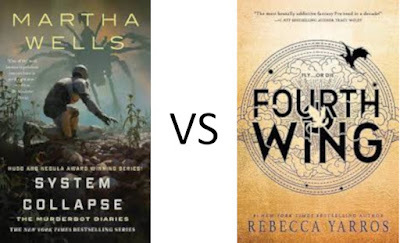
Over the last couple of years I've gotten the impression science fiction isn't what it used to be in a number of different ways. This may simply be a reflection of my gradual disenchantment with the genre over the last few years. But I think there is something more in it. One aspect of this feeling is that, at least in traditional publishing, SF is both changing focus and slowly fading. I can't speak to the changes, as I've read only a few modern SF books, but it seems that many of the SF orientated YouTube channels and blogs only cover old, "classic" books from 20, 30, 40 plus years ago. It seems like fantasy is now the in read for fans of speculative fiction. Can I verify this?
Unless you're a publishing insider and have access to a lot more data than I do, this feeling can not be tested. At least directly. But I think I've found a way to compare the sales of the two genre, relative to each other.
So how do we compare SF sales to fantasy without knowing the figures?
We start with the fantasy author, Mark Lawrence, who is something of a numbers guy. He has asserted that there is a direct correlation between the number of ratings on Goodreads and the sales of a traditionally published book. He says that if you take the number of ratings for a recently published book on Goodreads, multiply it by 4, it will give you a ballpark figure as to the number of books sold. His blog post about that is here. He bases this relationship on the data he has from his books and other authors. People dispute this number, and it certainly doesn't seem to work for indie published books... At least from my experience. But I think the relationship between ratings and sales numbers is strong enough that one can compare ratings numbers to ratings numbers and get a useful comparison of relative sales. Good enough for our purposes, anyway.
Next, what books to we compare? Hundreds of books are published every year in SF and fantasy. How do you find and select books to compare? As it turns out, the Goodreads has just released its list of the Best Books of 2023. It features 20 books in both the SF and fantasy categories. Goodreads says that the books were selected by analyzing statistics from the millions of books added, rated, and reviewed on Goodreads and published in the last 12 months. The sample includes books from all types of publishers; traditional and indie publishers. This seems to me as valid a sample as any. For my analysis I used SF, fantasy, and romantasy (a mash-up of romance and fantasy). I did not use YA fantasy for my comparison, since I hadn't see that category until after I had done the table below. However, there is no YA SF category to compare it to, which, in itself, I think is telling.
On 16 November 2023W I sampled each of the 20 books in the three categories; SF, fantasy and romantasy. I recorded the number of ratings each book had at that time, plus the number of months each book had been on the market. I also noted the sex of the author, and the size of the publisher. I added up the total number of rating for all 20 books in each category. I then added up the collective number of months the books had been on the market. To get one figure to compare each category to, I divided the total number of ratings by the total number of months the books had been in the market to arrive at an average number of ratings-per month for the entire category. In my model, this number of ratings per month represents the relative sales of each of the three categories, which then can then be compared.
So what do the numbers say?
Romantasy was the most popular category, at least in this sample. First, all the books were written by female authors. It is romance, after all. One author, Jennifer L Armentrout, had three of the 20 books on this list. She must be both a popular and prolific author. One book however, Fourth Wing, by Rebecca Yarros, dominates this category in ratings, and presumably sales, with 719,631 ratings at the time I sampled it. (The number of ratings of all the books will have gone up by the time I release this post.) Large, Big 5 Publishers, released 4 of the books, with 3 coming from what I think are medium sized publishers. The rest were either indie published or came from small presses, making their ratings numbers all the more impressive for that.
Fantasy was dominated by books released by large publishers; 14 out of the 20, with 6 coming from medium sized publishers. No indie published books made this list. Women authors once again dominated, authoring 15 of the 20 selections. Hell Bent, by Leigh Bardugo, had the most ratings, 88,513, followed by Brandon Sanderson's Tress of the Emerald Sea, with 74,180 ratings. Martha Wells had a book in this category as well as one in SF.
Now, looking at SF, the book with the most ratings in SF was In the Lives of Puppets, by T J Klune, with 40,266 ratings. Martha Well's entry, System Collapse, a MurderBot story had just been released in Nov, so the ratings for that book only clocked in at 1,857. It is probably significantly higher now. This category featured 12 male and 8 female authors. As for publishers, 10 of the books in this category were published by large publishers, 2, medium, and 8 appear to have been indie or small press releases. I should also point out that the SF list includes books from five well known SF writers; Martha Wells, John Scalzi, Pierce Brown, Ann Leckie, and Adrian Tchikovsky, so that I don't think SF's best selling authors are under represented on the list. They may well be over represented.
Now on to the comparison;
Romantasy came in with an average of 9,940 ratings per month for the field of 20 books, largely thanks to Fourth Wing.
Fantasy clocked in at 3,815 ratings per month average for the 20 books.
Science Fiction trailed the pack with a 1,496 ratings per month average for their 20 books.
The combined categories had 43 female vs 17 male authors. 72% vs 28% US readership split is 64.3% female vs 35.7%, male, so the author to readership ratio is fairly reflective of the audience.
Using these figures, it would seem that fantasy outsells SF by more than 2 1/2 to 1, 72% vs 28%. For comparison, years ago when the Data Guy broke out Amazon sales numbers, I think the fantasy to SF ratio was more like 3 to 2 66% vs 33%. Fantasy was outselling SF even then. But using this data it would seem that since then fantasy's lead has only grown.
However, if we roll romantasy's average monthly ratings into the general fantasy, it is fantasy, after all, and divide that total by 2 to get an average of the combined fantasy categories, we get a monthly average of 6,877 ratings per month. Using this figure, fantasy outsells SF by 4 to 1, 82% vs 18% And remember, we're not counting YA fantasy in these comparisons, which I am quite certain, judging from my granddaughter, would make the sales ratio even more daunting.
You can discount these results, as you please. One might argue that SF readers are reading older SF titles, if SF booktube is any guide, not the 2023 titles, which this sample only includes, and thus this comparison may underestimate SF readership. Or that the total number of books published in each category are probably not equal, as they are in this sample, which could distort the result. No doubt true, but that likely works in fantasy's favor, as I am certain that publishers are publishing more fantasy than SF these days. And since we find indie published books in this sample, I think we have a pretty well rounded sample. While fantasy, has never entirely absent from speculative fiction, it played a minor role until the early 1970's when Lord of the Rings became popular. Clearly it has come a long way in the last 50 years.
Fashion rules the world. Everything comes into fashion, and then fades away, before returning again in a different guise. SF may rise again, or it may evolve and change into something unrecognizable. But for now, at least in books, SF seems to be falling out of favor with readers of the fantastic.
The data I used;
Title
Author
M/F
Ratings
Numbers
Pub.
Months on Market
Romantasy
The Jasad Heir
Sara Jasjem
F
6,592
Lg
5
The Foxglove King
Hannah Witten
F
12,254
Lg
8.5
A Dawn of Onyx
Kate Golden
F
14,017
IP/sm
11
Assistant to the Villain
Hanna Nicole Maehrer
F
36,173
IP/sm
2.5
The Ashes and the Star Cursed King
Carissa Broadbent
F
101,042
IP
7
Zodiac Academy, Sorrow and Starlight
Caroline Peckham
Susanne Valenti
F/F
34,123
Med
11.5
The Hurricane Wars
Thea Guanzon
F
4,383
Lg
1.5
A Soul of Ash and Blood
Jennifer L Armentrount
F
41,379
IP/sm
4
The Hanging City
Charlie N Holmberg
F
7,738
Med
3.5
The Coven
Harper L Woods
F
22,757
Med
8
A Fire in the Flesh
Jennifer L Armentrout
F
13,640
IP/sm
.5
Bewitched
Laura Thalassa
F
6,580
IP/sm
7
Slaying the Vampire Conqueror
Carissa Broadben
F
10,602
IP/sm
6.5
Rule of the Aurora King
Nisha J Tuli
F
13,587
IP/sm
7.5
A Game of Gods
Scarlett St Clair
F
6,237
IP/sm
3.5
Fall of Ruin and Wrath
Jennifer L Armentrount
F
18,983
IP/sm
2
Fourth Wing
Rebecca Yarros
F
719,631
IP/sm
6.5
Throne of the Fallen
Kerri Maniscalco
F
7,061
Lg
1.5
Queen of Thieves and Chao
K A Tucker
F
2,247
IP/sm
2
A Court This Cruel and Lovely
Stacia Stark
F
9,824
IP/sm
8
Average Ratings per month per book: 9,940
21F
1,063,630 total ratings
4 Lg
3Med
13 IP/ Sm
107 months total
Fantasy
A Day of Fallen Night
Samantha Shannon
F
20,315
Med
8.5
Ink Blood Sister Scribe
Emma Torz
F
20,239
Lg
5.5
The Fragile Threads of Power
V E Schwab
F
7,940
Lg
2
Atalanta
Jennifer Saint
F
9.830
Med
8
The Adventures of Amina AL-Siraf
Sharron Chakraborty
F
26,335
Lg
8.5
The Unmaking of June Farrow
Adrienne Young
F
10,929
Med
1
Sword Catcher
Cassandra Clare
F
4,713
Lg
1
Victory City
Salman Rushdie
M
8,201
Lg
10
Bookshops and Bonedust
Travis Baldree
M
4,748
Med
.5
Emily Wilde’s Encyclopaedia of Faeries
Heather Fawcett
F
40,942
Lg
11
Stone Blind
Natalie Haynes
F
30,974
Lg
2
VenCo Cove
Cherie Dimaline
F
6,508
Lg
10.5
The Book that Wouldn’t Burn
Mark Lawrence
M
8,096
Lg
6.5
Clytemnestra
Constanza Casat
F
12,532
Lg
6.5
Tress of the Emerald Sea
Brandon Sanderson
M
74,180
Lg
7.5
The Last Tale of the Flower Bride
Roshani Chokshi
F
15,529
Lg
0
Witch King
Martha Wells
F
10,507
Lg
5.5
Hell Bent
Leigh Bardugo
F
88,513
Med
11
Starling House
Alix E Harrow
F
22,534
Lg
1.5
The Will of the Many
James Islingto
M
7,591
Med
6
Average Ratings per month per book: 3,815
Combining Romancy with fantasy Aver. Rating per month per book: 6,877
15F 5M
431 156 toal ratings
14 Lg
6 Med
113 months
total
Science Fiction
The Ferryman
Justin Cronin
M
20,161
Lg
7
System Collapse
Martha Wells
F
1,857
Lg
0
I Keep My Exoskeletons to Myself
Marsha Crane
F
3,146
IP/sm
11
Deluge
Stephen Markley
M
2,347
Lg
10
Starter Villain
John Scalzi
M
12,481
Lg
2
Translation State
Ann Leckie
F
5,547
Lg
5
Light Bringer
Pierce Brown
M
20,694
Med
3
In the Lives of Puppets
T J Klune
M
40,266
Lg
7
Some Desperate Glory
Emily Tesh
F
4,648
Lg
7
Ascension
Nicholas Binge
M
5,865
IP/sm
7
The Light Pirate
Lilly Brooks-Dalton
F
21,684
IP/sm
11
The Great Transition
Nick Fuller Googin
M
1,042
IP/sm
4
The Jinn-Bot of Shantiport
Samit Basu
M
236
Lg
2
The Marriage Act
John Marrs
M
11,074
IP/sm
11
Bridge
Lauren Beukes
F
811
IP/sm
3
The Future
Naomi Aldersman
M
870
Lg
1
Chain-Gang All-Star
Nana Kwame Adjei-Brenyah
M
15,061
Sm
6
Children of Memory
Adrian Tchikovsky
M
12,942
Lg
10
The Deep Sky
Yume Kitasei
F
3,144
Med
5
Land of Milk and Honey
C Pam Zhang
F
3,168
IP/sm
3
Average Ratings per month per book: 1,496
12 M
8 F
187,044 total ratings
10 Lg
2 Med
8 IP/sm
125 moths total
November 18, 2023
The Saturday Morning Post (No. 22)

Today I have a well regarded, award winning, fantasy novel from 2018 to review. I had put this ebook on reserve four or five months ago and it only recently became available. That says something about how popular this five year old book is. Let's get into it.
My reviewer criteria. I like light, entertaining novels. I like smaller scale stories rather than epics. I like character focused novels featuring pleasant characters, with a minimum number of unpleasant ones. I greatly value clever and witty writing. I like first person, or close third person narratives. I dislike a lot of "head jumping" between POVs and flashbacks. I want a story, not a puzzle. While I am not opposed to violence, I dislike gore for the sake of gore. I find long and elaborate fight, action, and battle sequences tedious. Plot holes and things that happen for the convenience of the author annoy me. And I fear I'm a born critic in that I don't mind pointing out what I don't like in a story. However, I lay no claim to be the final arbitrator of style and taste, you need to decide for yourself what you like or dislike in a book.
Your opinions are always welcome. Comment below.
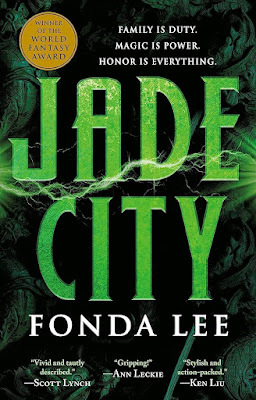
Jade City by Fonda Lee DNF 52%
Quitting it at the 52% mark should tell you that I enjoyed the story, for a while. At first I was thinking that it would be a B grade read. But as the story went on, and on, I found that I had to force myself to pick the book up to read it. And finally, when I found myself skim reading long exposition pages and even action sequences, I decided that I had enough. It simply wasn't working for me.
Why? I've got the time, so if you do as well, let's go a little deeper into why this didn't work for me.
The story is set in Kekon, a fictional fantasy version of a Japan or Korea-like country. It is an island nation that had recently throw off fairly modern colonial rulers during some sort of world war. The setting is a late 20th century time period like era, with cars and expressways, airplanes, land phones, TVs, etc, all, I gather, relatively recently introduced. The world building is okay, Japanese-y, but with nothing particularly unique about it. The jade in the title comes from the fact that for a certain race of people, wearing jade gives them magical/super powers, but if they wear too much, it can make them go crazy and kill them.
The story concerns ex-freedom fighters who expelled the occupying colonial power, but are now criminal gangs, each of which control sections of the city of Janloon. We have the No Peak Clan, and their major rivals the Mountain Clan, as the main factions with a clan war brewing between them. In this respect it is a gangster story. We see the story from the No Peak Clan perspective, mostly. They are the "good guys" (sic) in the story.
My personal issues with this story include...
I'm not a crime story reader and I can't say that I would naturally root for a crime family. While the No Peak Clan seemed nice enough for a criminal enterprise, well, as you sow, so shall you reap. Que sera sera was pretty much my attitude.
The story is told from point of view of multiple characters, which is not my cup of tea. I found that there were too many for me to care about any one of them. Some of the point of view characters were not members of the No Peak Clan, and there was, I believe, some clumsy foreshadowing about one such character. The thing about stories of this type, beyond not spending enough time with any one character to develop an emotional tie to, is that they seem artificial to me. A constructed story, rather than an organic narration. I can sense the author building the story just behind the scenery as they assemble their mosaic of subplots.
Next, I don't like stories where the plot depends on people doing dumb things. I realize that a lot of stories require people to make mistakes, or do foolish things, but I don't like it when it seems that the story hangs on it. I also don't like choices that seem designed to create conflict/tension that don't make a lot of sense when examined from outside the plot. Let me explain.
Some mild spoilers ahead.
For an example in this book of people doing dumb things for the convenience of the plot, we have a sister of the No Peak Clan's leader. She has given up wearing jade, wishes to stay clear of the clan, and wants to live her own life. This includes having her own apartment outside of the guarded clan compound. However, without wearing jade, she does not have the magical/super powers that go with them. So with the first skirmishes of the clan war already underway, you would think that she would realize that she was a soft target to either be killed or kidnapped and use against her clan while living alone or traveling around a contested city. Despite her reluctance to don the jade again, you would think the danger would be obvious enough to her to don her jade in self defense, or at least live within the compound. But no, she hadn't at the 52% mark, and I have to believe that fact will come into play sooner or later, especially since she sent a secret bodyguard packing. Dumb. To me that doesn't make sense. She's not that naïve, so I have to believe that's for the convenience of the plot.
More central to the story is the fact that the more jade one wears the greater ones powers - as long as the person can control the power. Wear too much jade and it destroys the person. Jade does not appear to be any more rare than jade in this world. While the amount of jade produced is controlled, it is the criminal gangs who controlled the supply, so that you would think that each of these criminal organizations would be able to supply their thugs with all the jade they could handle. That being the case, I don't see why there would be any reason to wear the jade from a dead enemy thug in addition to their own, and thus, risking jade overload. This, however, is a major plot point, as the leader of the No Peak Clan kills an opponent in a duel and adds his jade ornaments to his own. However, he is not able to handle all that jade, causing all sorts of physical and mental issues. The in-story explanation amounts to saving face, showing how strong in handling jade he is, but you could just as easily argued that by showing distain for the defeated thug's jade, as something he doesn't need, would enhance his standing. Knowing the fate of those who overload themselves, there is no reason why this character should poison himself, still he does. It seems to be pure stupidity on his part, and to me, the reader, it seems something done only in the service of drama and plot, as it will no doubt play a large part in the last half of the story.
In addition, I found that the pacing rather slow, due, I think, to all the chapters devoted to subplots. There were at least six sub-plots that we were following, each featuring the various point of view characters. Some readers like these complex stories where all the sub-plots come together at the end, I don't. As I said at the beginning, I find this type of story too deliberately scripted to suspend my disbelief. In this story all those sub-plots just made for a fragmentary read that broke the narrative flow, for me.
Last word; all of my complaints arise out of my personal biases. If you don't share them, you may well like this book.
Coming next week; another fantasy novel and a detective novel reread.
November 15, 2023
Best of Times, Worst of TImes
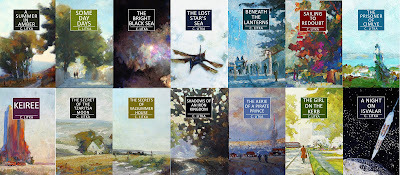
The Tale of Two Cities opens with the line; "It was the best of times, it was the worst of times..." Looking at my latest sales report, that line could apply to my report as well. Not that I'm complaining, it is still the best of times when it comes to sales totals. But if you look closer, you can see that those numbers hide, if not the worst of times, a tale of how times have changed in author publishing business, for the worst, for most of us.
Let's take a look at my sales, specifically how easy or hard it is to sell books, and how it may have changed over the years. I will compare my first year as a publisher, that would be 2015-16, to my last full year, 2022-23. A Summer in Amber was my first book. I released it in late April 2015, followed in July by Some Day Days, and then The Bright Black Sea in September. In those first 12 months I sold 6,608 books. The best way to answer my initial question seems to be to measure those sales with a crude metric, sales per year per book. To do that we simply divide total sales into 3 equal parts, one for each book, even though they were on the market for varying lengths of time and sold in different amounts. What we want is an average sales rate per book per year. Dividing 6,608 by 3 we get 2,202 copies sold per book per year on average in 2015-16.
Now let's compare that average per book sales to my 2022-23 sales results. I sold 19,524 books in 2022-23. A record number. Great! However, since I now have 14 books for sale, we need to divide those 19,524 books by 14, which gives us a sales per book per year average of 1,394 copies! Nearly half of the per book average of 2015-16. It certainly seems that it is getting harder to sell books. Even free books.
But wait! That total included audiobooks. I wasn't offering audiobooks in 2015-16. So if we want a more accurate comparison, we should only count ebooks for 2022-23;which would be 11,326 of them. Divide that number by 14 we get a sales per book per year average of just 809 copies, down considerably from the 2015-16 rate of 2,202. In 2022-23 I'm selling books with about 37% of the efficiency that I was in 2015-16. And this, mind you after having been in the business for 8 years.
But you know what? Those 2021-22 sales numbers above include ebook sales on Google. In 2015-16 I wasn't selling books via Google. I sold only thru Smashwords, et. al. and Amazon. So if we want to accurately study the decline in sales, we need to compare sales rates between 2015-16 and 2022-23, apples to apples. Thus, we should probably count only my 2022-23 Smashwords and Amazon sales of ebooks, which came in at about 6,253 copies. Dividing that total by 14 yields a sales per book per year average of just 446! Yikes! I'm now only 20% as efficient at selling books compared 2015-16 on those two stores. And the 2022-23 number includes the unparalleled sales of 2,790 copies of The Girl on the Kerb. Had that book sold like all the others, the result would have been even lower. More like 300 copies per book.
So, over the last eight years, I've gone from selling an average of 2,202 copies of every ebook I offer per year down to only 446 copies per ebook per year between Amazon and Smashwords. If sales had continued at the 2015-16 rate I would be selling something like 30,828 ebooks a year on Amazon and Smashwords alone, instead of 6,253. Talk about diminishing returns. Only the fact that I expanded my distribution to Google in both ebooks and audiobooks has kept Cealanda Press chugging along. And Google sales will no doubt fade as time goes by as well.
The simplest explanation would appear to be that I'm not writing books people want to read. There is some validity to this, as my books are not mainstream SF. However, since I've been writing in a very similar style right from the get go, that seems unlike to be the reason for the decline in rate of sales. I think the fact that I write a variety of stories may make it hard to capture every sale from every reader; illustrated by the fact that my space opera, The Bright Black Sea outsells every book by a significant margin. A slightly more likely explanation is that I may have already reached most of the "low hanging" readers who are open to reading my books, making finding new readers increasingly harder to come by. New books? New books sell more, and I had released three new books in 2015. Well, I release 2 new books in 2022-23 so that newly released books are likely not a factor. While most of the books in my catalog "old," having been around for a few years, that is not a negative. Having a back catalog of books is, I think, a plus in author publishing, allowing a reader who stumbles upon one of your books and likes it, the chance to immediately go on to read more of your books.
One might also blame the fact that there are way more books available today than in 2015. But even back then, there were way too many books as well, so I don't think this is a major cause in the decline in sales efficiency I'm seeing.
What I think makes it ever harder to sell books is the fact that the author publishing market has consolidated, just like businesses do in the real world... It has become a "big" business, relatively speaking, compared to the good old days of 2012 -16. These days you need to go big or go home. Now an author wishing to publish their book has to approach publishing very much as a business if you want to sell more than a handful of books. And be ready to spend money on it.
Another factor may be that readers of ebooks have found their groove and settled into it. They don't leave it to beat the weeds for new and different reads like they may've back in the early days of ebook publishing. And even if they do search out new books, there are so many books to choose from, that no author publisher can expect to sell many books to these intrepid explorers.
A final reason may be that Amazon has gotten serious about make even more money off of author publishers by selling, rather than just giving away, discoverability to authors; i.e. they sell ads on every product page. Most of the books you see on any product page appear there because some author paid money to have it there. These ads are critical to finding readers. So much so that I know of several full time fantasy authors who spend "only" $1,000 to $1,200 per month on advertising ($12-18K a year). Of course their sales support those ad buys, but it serves to illustrate the scale of business operations needed to sustain a successful full time publishing career in author publishing these days. One can probably get by on less, if one doesn't need to earn a living from writing, but even so, one can easily spend thousands of dollars, and never see much, if any, of it again.
I have to wonder if anyone starting off as an author publisher today with anything less than a great book, accurately targeted at a lucrative genre/subgenre, and a startup budget in the thousands of dollars will ever sell more than a handful of books.
Oh well, I guess I can play the "glad game" and say that I'm glad I'm still selling as many books as I am, enough so that the "best of times" numbers do a darn good job of masking the "worst of times" numbers of my publishing business.



